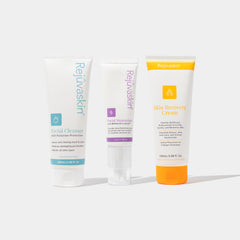Laser treatments and chemical peels are powerful cosmetic procedures designed to rejuvenate the skin by stimulating collagen production and increasing cell turnover. However, they also disrupt the skin barrier, leading to dryness, sensitivity, and an increased risk of irritation. Hydration plays a critical role in the healing process, ensuring that your skin recovers effectively while achieving the desired results from the procedure. This blog will explore the science of hydration in post-treatment recovery and how products like Rejuvaskin’s Skin Recovery Cream can support your healing journey.
The Importance of Hydration in Skin Recovery
How Laser Treatments and Chemical Peels Impact the Skin
Both laser treatments and chemical peels work by creating controlled damage to the skin, promoting regeneration. This process temporarily disrupts the skin barrier, leading to:
- Increased transepidermal water loss (TEWL): The skin loses more water than usual, resulting in dryness and tightness (Pahnke et al., 2021).
- Increased sensitivity: The skin becomes more vulnerable to irritants, redness, and inflammation.
- Prolonged healing time: Without proper hydration, the recovery process slows, potentially compromising results (Ousey et al., 2016).
Why Hydration Matters
Hydration supports:
- Barrier repair: Moisturized skin facilitates the rebuilding of the stratum corneum, the outermost layer of the skin, which protects against environmental aggressors.
- Cellular function: Proper hydration is essential for optimal cell turnover and collagen synthesis.
- Comfort: Hydration reduces irritation, redness, and flaking, promoting smoother recovery (Visscher et al., 2001).
How to Hydrate Your Skin Post-Treatment
1. Use a Recovery Cream Designed for Post-Treatment Skin
A high-quality recovery cream is the cornerstone of post-treatment hydration. Choose one formulated with barrier-repairing and soothing ingredients to accelerate healing.
How Rejuvaskin Helps:
Rejuvaskin’s Skin Recovery Cream is an ideal post-treatment moisturizer. Its formula includes:
- Hyaluronic Acid: A potent humectant that attracts and retains moisture, ensuring deep hydration.
- Polypeptides: Promote collagen synthesis, aiding in skin regeneration.
- Squalane: Lightweight hydration that mimics the skin’s natural oils.
- Botanical Extracts: Calm inflammation and reduce redness.
2. Reapply Moisturizer Regularly
Immediately after your treatment, apply a generous layer of recovery cream and reapply as needed throughout the day. Keeping the skin consistently hydrated minimizes dryness and flaking.
3. Avoid Harsh Products
Skip products with alcohol, fragrances, or acids that can further irritate your skin. Stick to gentle cleansers and avoid exfoliating until your skin has fully healed (Collawn et al., 1998).
4. Stay Hydrated Internally
Drink plenty of water to support your skin’s hydration from within. Proper hydration helps maintain the skin’s moisture balance and accelerates recovery.
5. Protect Your Skin with SPF
Hydrated skin is more sensitive to UV damage after cosmetic procedures. Apply a broad-spectrum, mineral-based sunscreen daily to protect your skin while it heals.
The Role of Hydration in Optimizing Results
Hydration doesn’t just speed up healing—it enhances the overall outcome of your procedure. Studies show that properly hydrated skin recovers faster, experiences fewer complications, and achieves smoother, more radiant results (Theerawattanawit et al., 2021). Rejuvaskin’s Skin Recovery Cream ensures your skin remains hydrated and supported throughout the healing process.
Key Takeaways
- Hydration is essential for repairing the skin barrier, reducing sensitivity, and accelerating healing after laser treatments or chemical peels.
- Rejuvaskin’s Skin Recovery Cream offers deep hydration and barrier repair with ingredients like hyaluronic acid, squalane, and polypeptides.
- Combine a hydrating skincare routine with gentle cleansers, SPF protection, and internal hydration for optimal results.
Works Cited
- Collawn, S., Boissy, R., Gamboa, M., & Vásconez, L. (1998). Ultrastructural study of the skin after facial chemical peels and the effect of moisturization on wound healing. Plastic and Reconstructive Surgery. Retrieved from link
- Ousey, K., Cutting, K., Rogers, A., & Rippon, M. (2016). The importance of hydration in wound healing: reinvigorating the clinical perspective. Journal of Wound Care. Retrieved from link
- Pahnke, F., Peckruhn, M., & Elsner, P. (2021). Pre- and post-interventional skin care for laser and peel treatments. Der Hautarzt. Retrieved from link
- Theerawattanawit, C., Promvaranon, T., Rerknimitr, P., et al. (2021). Snail soothing and repairing cream improves skin hydration after ablative fractional CO2 laser. Skin Pharmacology and Physiology. Retrieved from link
- Visscher, M.O., Hoath, S.B., Conroy, E., & Wickett, R.R. (2001). Effect of semipermeable membranes on skin barrier repair following tape stripping. Archives of Dermatological Research, 293, 491-499. link.





















Leave a comment